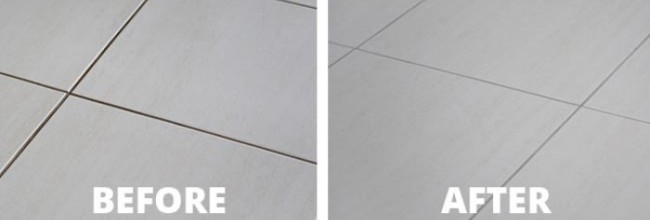The Chemistry of Cleaning

Bicarbonate soda and vinegar are great for cleaning, but are you rendering them useless by the way you use them?
I have recently moved into a new house and the grout between the floor tiles was black with years of built up grime! Yuck!!
I finally decided it was time to do something about it. The options before me seemed like a lot of hard work. And the possibility of crawling around with my knees and feet in some caustic cleaning agent whilst I breathe the fumes into my lungs did not seem an effective way to care for my body.
So I decided to think about the chemistry of cleaning agents in order to work out the best way to do this.
As someone concerned about our environment, I have used bicarbonate soda and vinegar for years for cleaning but I have been confused by the many people who recommend sprinkling bicarb in the sink or toilet bowl and then spraying vinegar around on top of the bicarb. It makes lots of lovely bubbles that you can see and hear, but is it really cleaning anything?
The answer is NO!!
A neutralization reaction is occurring. (We cover this in the Year 9 chemistry course). And, in this case, carbon dioxide gas is being produced which makes all the bubbles.
Bicarbonate soda (or sodium bicarbonate) is a base. When mixed with water it becomes alkaline (pH greater than 7) and is a great cleaner for cutting through dirt, grease and grime. Other alkaline cleaners include soap, bleach, laundry detergent, ammonia, oven cleaner and many more. Most cleaning agents tend to be alkaline and they feel soapy.
Vinegar is an acid (pH less than 7) and is great for dissolving minerals and rust stains. Other acidic cleaning agents include toilet bowl cleaners, rust stain removers, calcium removers and lemon juice.
But mix them together and you get a neutralization reaction that results in salty water. Salty water is neutral (pH=7) and is good for nothing! It is as good as cleaning with plain water.
Vinegar + Bicarb ----> salty water (not table salt, by the way)
So what is the answer?
FIRST, use a soft paste of bicarbonate soda to cut through the grime. Leave it for 10 minutes if needed, to loosen the dirt, give it a scrub and wipe it off. If the bicarb is not strong enough (pH 8-9), then a stronger base in the form of a commercial bathroom cleaner could be used.
THEN, spray on the vinegar and leave it for 10 minutes to dissolve calcium build up and any other mineral deposits or rust stains that are present. Give another light scrub and wipe it off.
You will be left with clean grout and a non-soapy finish to your tiles as well (because the acid has neutralised any remnants of the soapy base). The vinegar is also a good antiseptic that kills many bacteria and viruses. Just be careful with vinegar – it is quite a strong acid (pH 3) that could damage some surfaces and produces fumes, so should only be used in a well ventilated area.
And when cleaning, don't forget HEAT. Heat is also a terrific cleaning agent, so hot, soapy water is always the first place to start when cleaning anything. This will remove most dirt, grime and bacteria from around the house, if used regularly.
Steam cleaning is also fantastic and great for the environment. It makes use of extreme heat and doesn't require any chemicals. If you have a steam cleaner that projects a fine burst of steam, then that can save a lot of scrubbing – use it to clean off the dirt that the bicarb has loosened. The steam will get into all the porous holes of the grout that a scrubbing brush cannot reach.
So remember:
Bases (bicarbonate soda, soap, detergent) in hot water clean dirt, grease and grime and wash away bacteria.
Acids (vinegar, lemon juice) dissolve minerals and kill bacteria.
Steam loosens dirt and kills bacteria.
Happy cleaning :-)
- Tags: chemistry
